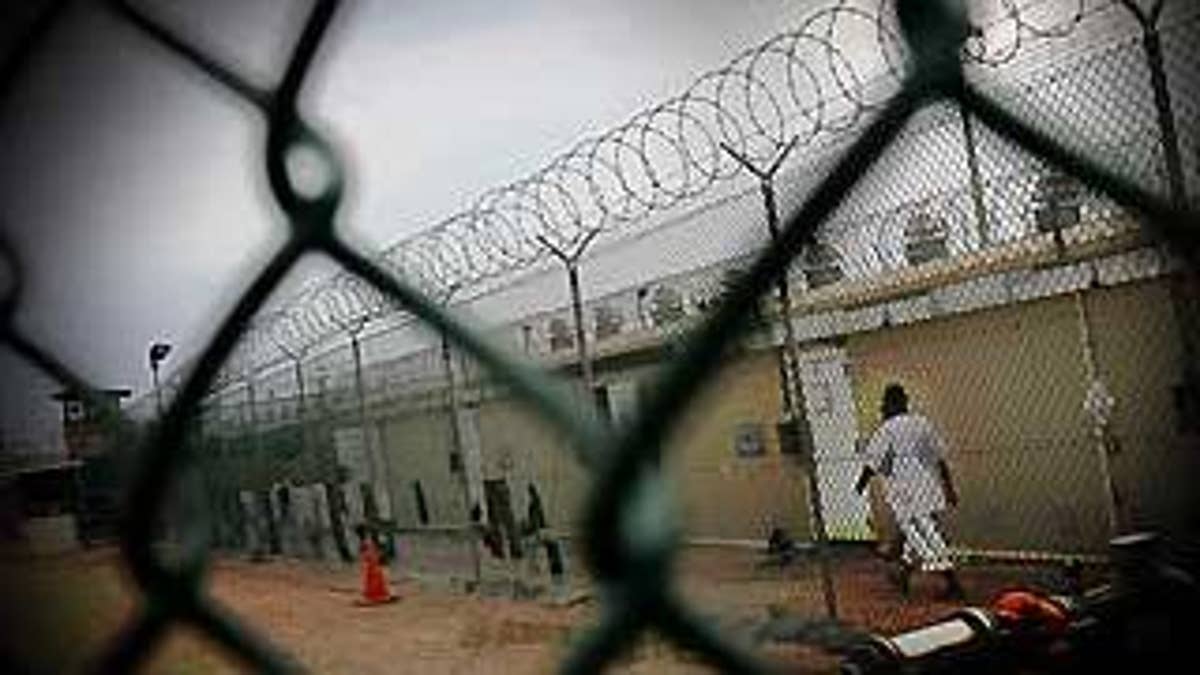
WASHINGTON -- President Obama's decision to re-institute the military tribunals at the U.S. prison at Guantanamo Bay has raised questions about whether such a plan is feasible, given that Obama has vowed to close the prison by January.
The Obama administration won't say which of the 241 detainees at the prison in Cuba will be tried before the commission. Only some of trials will occur at Guantanamo partly because the president is still committed to closing the prison within a year of taking office.
But experts say it will be almost impossible to conduct commissions there before its scheduled closure.
"There is no way in hell that they're going to get these commissions done by January of next year unless, for some odd reason, somebody decides to plead guilty," Charles "Cully" Stimson of the Heritage Foundation, told FOX News.
Obama announced Friday that the revived commissions will offer detainees additional legal protections -- specifically more freedom to select their lawyers, block the use of evidence obtained through coercion and limit the use of hearsay evidence.
Another change will allow military commission judges to establish the jurisdiction of their own courts.
"These reforms will begin to restore the commissions as a legitimate forum for prosecution, while bringing them in line with the rule of law," Obama said in the statement, adding that his administration will work with Congress on additional reforms."This is the best way to protect our country, while upholding our deeply held values."
Obama supported these changes while in the Senate. Administration officials say this is a key difference with President Bush's approach, and Obama should not be open to criticism for reviving the Bush approach to prosecuting suspected terrorists. These are changes to the Military Commissions Act that Obama unsuccessfully sought during congressional debate on the act in 2006.
White House press secretary Robert Gibbs rejected the notion that Obama was being inconsistent because he criticized the military commissions under the Bush administration.
The additional protections for detainees, he said, represents a far different system.
Sen. Patrick Leahy, D-Vt., said he will review Obama's proposed changes to ensure detainees are still treated fairly and humanely.
"I objected to the military commissions that were created by the Bush-Cheney administration because they stripped away critical protections in our laws," he said. "My primary concern remains that we stand by American principles."
But the ACLU didn't wait for a review to criticize Obama's decision.
"It is a mistake to depart from a system of justice that has worked so well for our country for two hundred years and to come up with a new system with new rules on the fly," ACLU attorney Ben Wizner told FOX News Radio.
"The rest of the world will be wondering why we have to create a new set of rules to try these alleged terrorists instead of using our old court system," he said. "And they will assume, and rightly so, that the new rules are designed to make it easier to convict people rather than to provide a full and fair trial."
Thirteen detainees have been identified as likely candidates for this approach, and that number may well grow larger, as prosecutors review a number of cases in which the re-instated military commissions could be used, senior administration officials told FOX News.
Administration officials, however, refused to speculate on the precise number of cases that will be adjudicated in military commissions, and they wouldn't confirm an Associated Press report that 10-20 additional detainees in custody at Guantanamo Bay will be subject to these trials.
One official said the additional numbers cited by the AP are "wrong" because prosecutors "have not made decisions" about how many detainees may be subject to military tribunals.
The continuation of military commission proceedings, the officials said, is designed to obtain "swift and certain justice" that Obama lawyers believe can withstand judicial scrutiny.
Republican lawmakers were quick to praise the news.
"I will review the president's proposal, but his willingness to return to the bipartisan approach of military commissions for trying detainees now held in Guantanamo Bay is an encouraging development," said Senate Minority Leader Mitch McConnell of Kentucky.
"Detainee policy is very complex. The president wants to collaborate with Congress to reform detainee policy and we should use this additional time to come up with a sensible national security policy regarding terror suspects," said Sen. Lindsey Graham, R-S.C.
"No detainees should be released into the United States. Detainees determined by the military or a federal judge to no longer be held as enemy combatants should be transferred to the custody of the Department of Homeland Security pending their transfer to another country," he added.
The White House was up against a 120-day deadline that ends Wednesday. Obama "suspended" the military commissions in January and is under pressure to develop a plan for what to do with the detainees at facility at Guantanamo Bay, Cuba, after vowing to close the facility. There also is the issue of the trial of Ahmed al-Darbi, a Saudi accused of plotting to attack a ship in the Strait of Hormuz, which is scheduled to begin May 27.
Another U.S. official who spoke with FOX News on condition of anonymity believes there are nine cases involving 13 detainees already in the system who will stay in the commissions. The official said there will be proposed changes proposed to the commissions, described to FOX News as "minor tweeking" that will be billed as significant to blunt attacks from the left.
Congress would be notified of the changes and would have 60 days to consider them.
The rest of the detainees would either be released, transferred to other nations or tried by civilian prosecutors in U.S. federal courts, an official said. It's also possible that some could continue to be held indefinitely as prisoners of war with full Geneva Conventions protections, a senior U.S. official told the Associated Press.
The tribunal system -- set up after the military began sweeping detainees off the battlefields of Afghanistan in late 2001 -- has been under repeated challenges from human rights and legal organizations because it denied defendants many of the rights they would be granted in a civilian courtroom.
In February 2008, during his presidential campaign, Obama described the Guantanamo trials as "a flawed military commission system that has failed to convict any one of a terrorist act since the 9/11 attacks and that has been embroiled in legal challenges." Critics, including many Democrats, cited the tribunals in assailing Bush, who had pushed Congress to create the system. They accused him of violating U.S. law by limiting the detainees' legal rights.
FOX News' Major Garrett, Catherine Herridge and The Associated Press contributed to this story.




